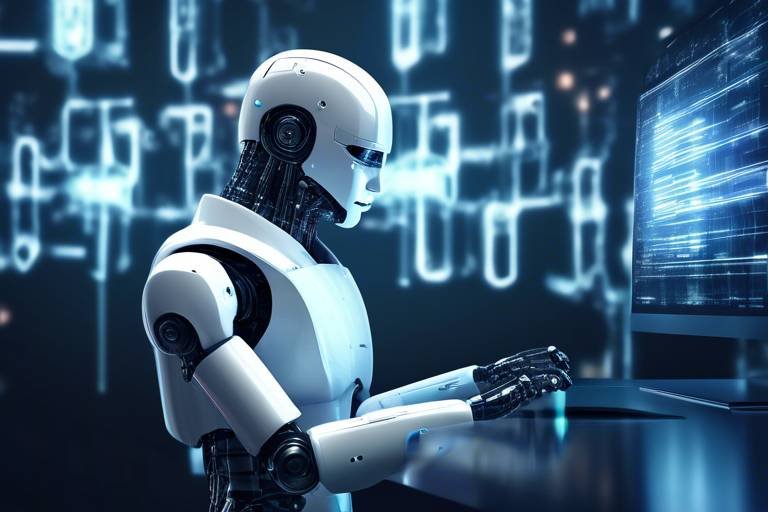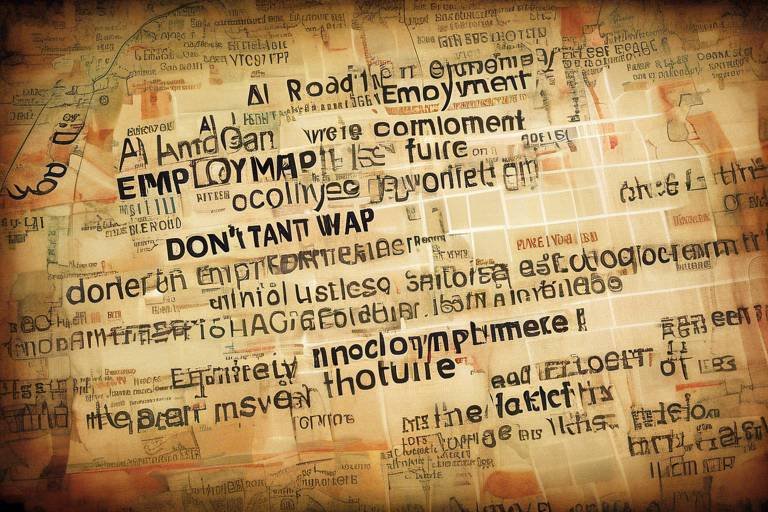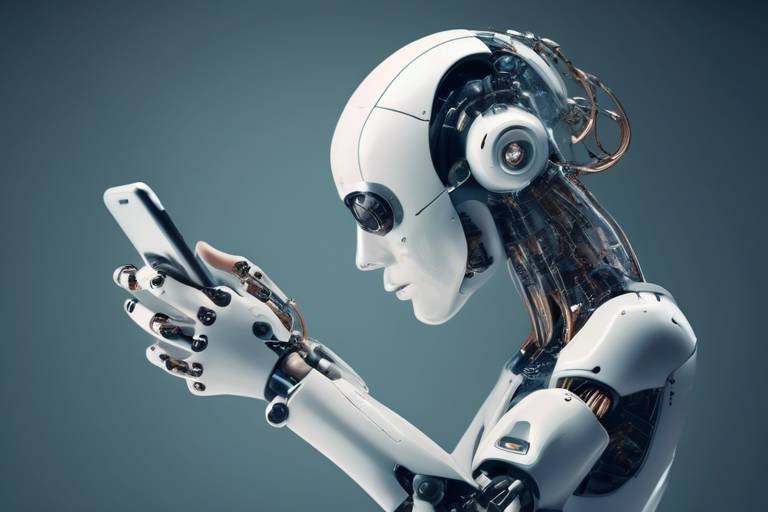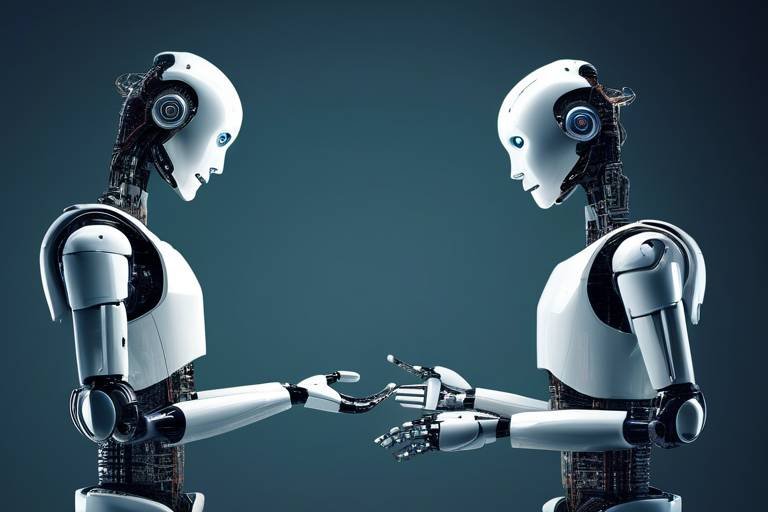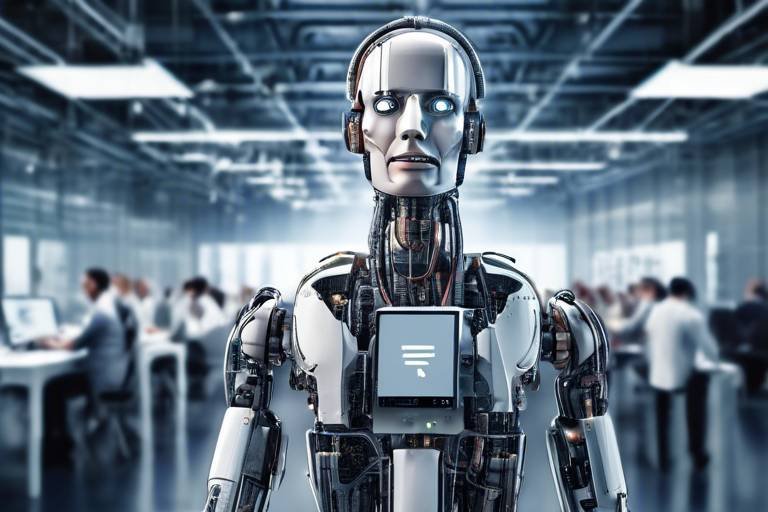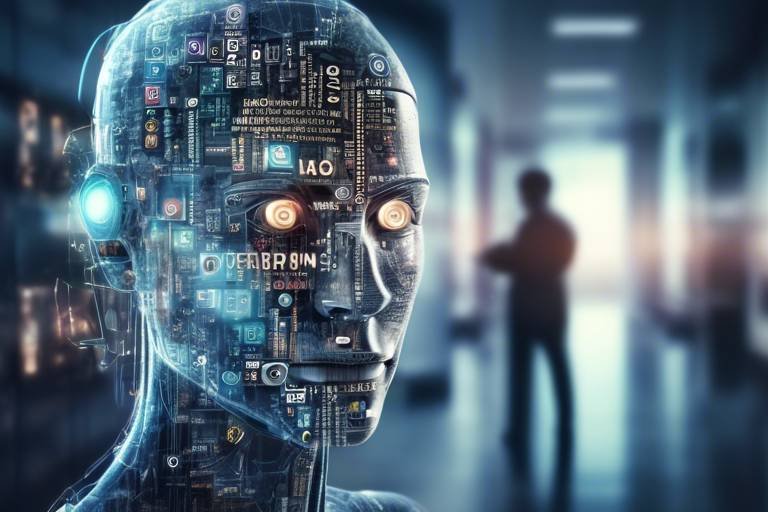AI and Future Jobs: A Tech-enabled Employment Perspective
In today's fast-paced world, the rise of artificial intelligence (AI) is not just a buzzword; it's a transformative force reshaping the job market as we know it. Have you ever wondered how these smart machines will affect your career? As AI technologies become more integrated into various industries, they are not only transforming traditional job roles but also paving the way for exciting new opportunities. This article dives deep into the impact of AI on employment, exploring emerging roles, the skills required for these positions, and what this means for both workers and employers in a rapidly evolving technological landscape.
The workplace is undergoing a seismic shift as AI technologies like machine learning, natural language processing, and robotics become mainstream. Imagine walking into an office where mundane tasks are handled by machines, freeing up human employees to focus on creative and strategic initiatives. It's not just a dream; it's happening now! Companies across sectors—from healthcare to finance—are leveraging AI to enhance productivity, improve decision-making, and deliver better customer experiences. This shift begs the question: how will workers adapt to this new reality?
As AI continues to evolve, it’s creating job roles that never existed before. Think about the last time you heard of a social media manager or a data scientist—these roles were virtually unheard of a decade ago. Today, we are witnessing the emergence of positions like AI trainers and ethics compliance specialists, highlighting the need for a workforce that is not just tech-savvy but also adept at navigating the complexities of AI. Let’s take a closer look at some of these promising careers.
The demand for data analysts and AI trainers is skyrocketing as organizations strive to harness the power of data. Companies are increasingly turning to data-driven decisions, making the role of data analysts critical. But what about AI trainers? These professionals are essential for teaching AI systems how to learn from data effectively. It’s a fascinating interplay of technology and human expertise.
To succeed as a data analyst, one must possess a unique blend of skills. Here are some essential competencies:
- Analytical Skills: The ability to interpret complex data sets and draw actionable insights.
- Data Visualization: Proficiency in tools like Tableau or Power BI to present data in a comprehensible format.
- Statistical Knowledge: Understanding of statistical methods to analyze trends and patterns.
With these skills, data analysts can turn raw data into valuable insights that drive business success.
Becoming an AI trainer requires a solid educational background in fields like computer science or data science. But it’s not just about formal education; hands-on experience with machine learning algorithms and an understanding of ethical AI practices are equally important. As AI systems become more complex, the role of the trainer will be pivotal in ensuring that these systems operate effectively and responsibly.
With the rapid rise of AI, the need for ethical oversight has never been more critical. Organizations are now seeking AI ethics and compliance specialists to navigate the ethical dilemmas posed by AI technologies. These specialists ensure that AI systems are developed and deployed in a manner that respects privacy, fairness, and accountability. The demand for such roles is expected to grow, as companies aim to build trust with their customers.
As AI continues to advance, the onus is on workers to adapt through reskilling and upskilling. Continuous learning is no longer optional; it’s a necessity in the modern workforce. Have you considered how you might need to evolve your skills to stay relevant? The good news is that there are numerous training programs and resources available to help workers transition into new roles.
From online courses to workshops, various resources are available for those looking to enhance their skills. Some popular platforms include:
- Coursera: Offers courses from top universities on AI and data science.
- edX: Provides a range of professional certificates in emerging technologies.
- LinkedIn Learning: Features courses tailored to specific skills needed in the AI landscape.
Employers also play a vital role in supporting employee development. By fostering a culture of learning and adaptation, companies can help their workforce navigate the challenges posed by AI. This means investing in training programs and encouraging employees to pursue continuous education. After all, a well-trained employee is an asset to any organization!
The introduction of AI raises valid concerns about job security for many workers. While some jobs may become obsolete, others will transform, requiring new skills and adaptability. It’s a double-edged sword: automation can enhance productivity but also create uncertainty. What can workers do to safeguard their careers in this new landscape?
Some roles are more susceptible to automation than others. For instance, jobs that involve repetitive tasks, such as data entry or assembly line work, are at higher risk. However, roles that require creativity, empathy, and complex problem-solving are less likely to be automated. Understanding which jobs are at risk can help workers make informed career choices.
Workers can adopt several strategies to enhance their job security in an AI-driven economy:
- Embrace Lifelong Learning: Always be on the lookout for opportunities to learn new skills.
- Network: Building relationships can open doors to new opportunities.
- Stay Informed: Keep up with industry trends and technological advancements.
Looking ahead, the future of work will likely involve a collaborative partnership between humans and AI. This collaboration has the potential to boost productivity and drive innovation. Imagine a world where AI handles data processing while humans focus on creative problem-solving—sounds like a win-win, right?
AI can augment human capabilities, allowing workers to tackle more complex and fulfilling tasks. For example, in healthcare, AI can analyze medical data, enabling doctors to make more accurate diagnoses and spend more time with patients. This synergy between humans and AI can lead to groundbreaking advancements across industries.
Despite the benefits, challenges remain in effective human-AI collaboration. Issues such as trust, transparency, and the need for clear communication can hinder this partnership. Addressing these challenges will be crucial for successful integration and maximizing the benefits of AI in the workplace.
In conclusion, preparing for an AI-driven job market requires proactive steps from both individuals and organizations. Workers must embrace continuous learning and adaptability, while employers should foster a culture of development and innovation. As we navigate this ever-changing landscape, the key takeaway is clear: adapting to the rise of AI is not just an option; it’s essential for survival and success in the future job market.
Q1: Will AI take away my job?
A1: While some jobs may become automated, many new roles are emerging that require human skills and creativity. It's important to adapt and learn new skills to stay relevant.
Q2: What skills should I focus on developing?
A2: Focus on skills that are less likely to be automated, such as creativity, emotional intelligence, and complex problem-solving. Technical skills related to AI and data analysis are also valuable.
Q3: How can I reskill for a new job in the AI landscape?
A3: Consider enrolling in online courses, attending workshops, and seeking mentorship opportunities in your desired field to gain the necessary skills.

The Rise of AI in the Workplace
Artificial intelligence is no longer just a concept from science fiction; it has become a fundamental part of our daily work life. From automating mundane tasks to enhancing complex decision-making processes, AI is revolutionizing how businesses operate. Imagine walking into an office where your computer can analyze data, predict trends, and even suggest the best course of action—all while you sip your morning coffee. This is the reality that many companies are embracing today.
As AI technologies continue to evolve, they are reshaping traditional job roles, making some obsolete while creating entirely new opportunities. For instance, industries such as healthcare, finance, and manufacturing are leveraging AI to improve efficiency and productivity. In healthcare, AI algorithms analyze patient data to assist doctors in diagnosing diseases more accurately and quickly. In finance, AI systems are employed for fraud detection and risk assessment, allowing companies to safeguard their assets more effectively. The manufacturing sector benefits from AI-driven robotics that can perform repetitive tasks with precision and speed, freeing human workers to focus on more strategic roles.
Moreover, the rise of AI is not just about replacing jobs; it's about enhancing human capabilities. Workers are now equipped with tools that allow them to accomplish more than ever before. For example, customer service representatives can utilize AI chatbots to handle basic inquiries, enabling them to devote more time to complex customer issues that require a personal touch. This collaboration between humans and machines is paving the way for a more efficient and innovative workplace.
However, this rapid integration of AI also brings challenges. Employees may feel threatened by the technology, fearing job loss or the need for new skills. It's crucial for organizations to address these concerns proactively. By fostering a culture of learning and adaptation, companies can help their workforce navigate the changes brought on by AI. This means investing in training programs and resources that empower employees to embrace new technologies rather than shy away from them.
In summary, the rise of AI in the workplace is a double-edged sword. While it presents opportunities for increased efficiency and new job roles, it also necessitates a shift in how we view work and the skills required to thrive in an AI-enhanced environment. As we move forward, the focus should be on collaboration, adaptation, and continuous learning to ensure that both individuals and organizations can harness the full potential of AI.
- What industries are most affected by AI? Industries such as healthcare, finance, and manufacturing are seeing significant changes due to AI integration.
- Will AI take away jobs? While AI may automate certain roles, it also creates new opportunities and enhances existing jobs by allowing workers to focus on more complex tasks.
- How can workers prepare for an AI-driven workplace? Continuous learning and upskilling are essential. Workers should seek training programs that focus on AI technologies and their applications.
- What role do employers play in this transition? Employers must invest in employee development and foster a culture of adaptability to help their workforce thrive in an AI-enhanced environment.

Emerging Job Roles Driven by AI
As we navigate through this technological revolution, it's fascinating to observe how artificial intelligence (AI) is not just a buzzword but a real game-changer in the job market. The emergence of AI has given rise to a plethora of new roles that were virtually unheard of a decade ago. These positions are not merely adaptations of existing jobs; they represent a fundamental shift in how we think about work and the skills required to succeed. Imagine a world where your job title could include "AI Ethicist" or "Machine Learning Engineer"—these are no longer just futuristic concepts but present-day realities!
The landscape of employment is evolving, and with it, the demand for innovative roles that leverage AI technology is skyrocketing. Industries across the board, from healthcare to finance, are integrating AI solutions to enhance efficiency and decision-making processes. This integration has led to the creation of specialized job roles that focus on harnessing AI's capabilities. For instance, positions like Data Analysts and AI Trainers are becoming increasingly vital as organizations strive to make data-driven decisions and train AI systems effectively.
But what does this mean for the average worker? It signifies a shift in the skill set that employers are seeking. As AI tools become commonplace, the need for professionals who can interpret data, train AI algorithms, and ensure ethical compliance is more pressing than ever. In a sense, the job market is mirroring the technological advancements we witness daily, making it crucial for workers to stay ahead of the curve.
Let's delve deeper into some of these emerging roles:
- Data Analysts: These professionals are the detectives of the data world, sifting through vast amounts of information to extract actionable insights. Their ability to visualize data trends and make sense of complex datasets is invaluable.
- AI Trainers: These specialists are responsible for teaching AI systems how to perform tasks accurately. They create training data, refine algorithms, and ensure that AI behaves ethically and effectively.
- AI Ethics and Compliance Specialists: With great power comes great responsibility. As AI technologies proliferate, so does the need for ethical oversight. These specialists ensure that AI systems are designed and operated in a manner that aligns with societal values and legal standards.
In summary, the rise of AI is not just about machines taking over jobs; it's about the creation of new opportunities that require a unique blend of skills and knowledge. As we embrace this technological wave, both workers and employers must adapt to the changing landscape, ensuring that the workforce is equipped to thrive in an AI-driven world.

Data Analysts and AI Trainers
In today's data-driven world, data analysts and AI trainers are becoming increasingly crucial to the success of organizations across various sectors. As businesses strive to make sense of vast amounts of data, the need for skilled professionals who can analyze and interpret this information has skyrocketed. Data analysts are the detectives of the digital age, sifting through complex datasets to uncover trends, insights, and actionable strategies that can propel a company forward.
On the other hand, AI trainers play a pivotal role in ensuring that artificial intelligence systems are not only effective but also ethical. These professionals are responsible for teaching AI models how to learn from data, making their expertise essential as organizations integrate AI into their operations. The collaboration between data analysts and AI trainers is a perfect example of how technology and human intelligence can work hand in hand to drive innovation.
The skills required for these roles are distinct yet complementary. Data analysts need to possess a robust set of analytical skills, including:
- Statistical Analysis: Understanding statistical methods is vital for interpreting data accurately.
- Data Visualization: Proficiency in tools like Tableau or Power BI is essential for presenting data findings in an understandable way.
- Programming Skills: Familiarity with programming languages such as Python or R can greatly enhance an analyst's ability to manipulate data.
Meanwhile, AI trainers must have a different set of qualifications that focus on the intricacies of machine learning and AI technologies. They need to understand:
- Machine Learning Algorithms: A solid grasp of various algorithms is crucial for training AI systems.
- Ethics in AI: Understanding the ethical implications of AI is becoming increasingly important as technology evolves.
- Communication Skills: The ability to convey complex concepts to non-technical stakeholders is essential for AI trainers.
As we look to the future, the demand for both data analysts and AI trainers is expected to grow significantly. Companies are recognizing that leveraging data and AI is not just an option but a necessity for staying competitive. Therefore, investing in the development of these roles is crucial for any organization aiming to thrive in the digital landscape.
Q: What qualifications do I need to become a data analyst?
A: Typically, a bachelor's degree in a related field, such as statistics, mathematics, or computer science, is required. Additionally, proficiency in data analysis tools and programming languages is highly beneficial.
Q: How can I transition into an AI trainer role?
A: Gaining experience in machine learning and understanding AI ethics is essential. You may also consider pursuing specialized training programs or certifications in AI technologies.
Q: Are data analysts and AI trainers in high demand?
A: Yes, as more companies adopt data-driven strategies and AI technologies, the demand for these roles is expected to continue rising.

Essential Skills for Data Analysts
In today's data-driven world, the role of a data analyst is more pivotal than ever. To thrive in this dynamic field, aspiring data analysts must equip themselves with a robust set of skills. First and foremost, strong analytical skills are essential. This means not just being able to crunch numbers but also interpreting what those numbers mean in real-world scenarios. Think of it as being a detective; you need to sift through data to uncover hidden trends and insights that can drive business decisions.
Moreover, proficiency in data visualization tools is crucial. Tools such as Tableau, Power BI, and even Excel can help analysts present data in a way that is easily digestible for stakeholders. Imagine trying to explain a complex dataset verbally—it's like trying to describe a beautiful painting without showing it. A good visualization can tell a story that raw data simply cannot.
Additionally, familiarity with programming languages such as Python or R is becoming increasingly important. These languages enable analysts to manipulate large datasets and perform advanced statistical analyses. Think of programming as your toolkit; the more tools you have, the more problems you can solve. Furthermore, a solid understanding of statistics is fundamental. Analysts must be able to apply statistical methods to validate their findings and ensure that their conclusions are sound.
Another key skill is critical thinking. Data analysts should not just accept data at face value; they need to question it, understand its context, and evaluate its reliability. This skill is akin to being a chef who tastes their dish at every stage of preparation, ensuring that each ingredient contributes positively to the final flavor.
Finally, strong communication skills are vital. Analysts often need to present their findings to non-technical stakeholders, translating complex data insights into actionable recommendations. It’s not just about what you know; it’s about how you convey that knowledge. Think of it as storytelling—your data is the plot, and your presentation is how you engage your audience.
In summary, the essential skills for data analysts can be encapsulated as follows:
- Analytical Skills
- Data Visualization
- Programming (Python, R)
- Statistical Knowledge
- Critical Thinking
- Communication Skills
By honing these skills, data analysts can not only enhance their employability but also contribute significantly to their organizations' success in the ever-evolving landscape of data analytics.
Q1: What qualifications do I need to become a data analyst?
A1: While a degree in a related field such as statistics, mathematics, or computer science is beneficial, many successful data analysts come from diverse backgrounds. Practical experience and proficiency in relevant tools often weigh just as heavily as formal education.
Q2: Is programming necessary for data analysts?
A2: Yes, having knowledge of programming languages like Python or R can significantly enhance your capabilities as a data analyst. These languages allow for more efficient data manipulation and analysis.
Q3: How can I improve my data visualization skills?
A3: Practice is key! Use tools like Tableau or Power BI to create visualizations from datasets you find interesting. Additionally, studying good examples of data visualization can provide insights into effective design principles.
Q4: What industries hire data analysts?
A4: Data analysts are in demand across various sectors, including finance, healthcare, marketing, and technology. Essentially, any industry that relies on data to make decisions can benefit from the expertise of a data analyst.

AI Trainer Qualifications
As the demand for artificial intelligence continues to surge, the role of the AI Trainer has become increasingly vital. These professionals are not just tech-savvy; they are educators at heart, bridging the gap between complex AI systems and the users who will benefit from them. To excel in this role, aspiring AI trainers need to cultivate a unique blend of skills and qualifications.
First and foremost, a solid educational background in computer science, data science, or a related field is essential. Many AI trainers hold degrees in these areas, as they provide the foundational knowledge necessary to understand machine learning algorithms and data processing techniques. However, formal education alone isn't enough. Practical experience with AI tools and technologies, such as TensorFlow or PyTorch, is critical. This hands-on experience allows trainers to grasp the nuances of AI development and deployment.
In addition to technical skills, communication abilities are paramount. AI trainers must be adept at explaining complex concepts in a way that is accessible to various audiences, from engineers to business executives. They often find themselves in situations where they need to simplify intricate AI processes, making clarity in communication a key qualification. Furthermore, a strong understanding of the ethical implications of AI is becoming increasingly important. Trainers must be equipped to address issues related to bias, transparency, and accountability in AI systems.
Moreover, the landscape of AI is ever-changing, which means that continuous learning is a must. AI trainers should stay updated with the latest advancements in technology and methodologies. Participating in workshops, attending conferences, and engaging with online courses can help trainers remain at the forefront of AI education.
To summarize, the qualifications for an AI Trainer include:
- Educational Background: Degree in computer science, data science, or a related field.
- Technical Proficiency: Experience with AI tools and programming languages.
- Communication Skills: Ability to convey complex information clearly.
- Ethical Understanding: Knowledge of AI ethics and compliance.
- Commitment to Lifelong Learning: Ongoing education and professional development.
In essence, becoming an AI Trainer is not just about having the right degree or technical skills; it's about being a passionate educator who is committed to fostering a deeper understanding of AI among users. As the world increasingly relies on AI technologies, the role of the AI Trainer will be crucial in ensuring that these systems are used effectively and responsibly.
Q1: What is the primary role of an AI Trainer?
A1: The primary role of an AI Trainer is to educate users about AI systems, ensuring they understand how to interact with and leverage these technologies effectively.
Q2: Do I need a specific degree to become an AI Trainer?
A2: While a degree in computer science or data science is beneficial, practical experience and strong communication skills are equally important for this role.
Q3: How can I stay updated with the latest AI trends?
A3: Engaging in continuous education through workshops, online courses, and industry conferences is essential for staying current in the rapidly evolving field of AI.
Q4: What ethical considerations should AI Trainers be aware of?
A4: AI Trainers should be knowledgeable about issues such as algorithmic bias, transparency, and the ethical implications of AI deployment to ensure responsible use of technology.

AI Ethics and Compliance Specialists
As artificial intelligence continues to permeate various sectors, the demand for is rapidly escalating. These professionals are essential in ensuring that AI technologies operate within ethical boundaries and comply with regulatory standards. With the potential for AI to impact decision-making processes—from hiring practices to law enforcement—the role of ethics in AI cannot be overstated.
AI ethics and compliance specialists focus on a variety of critical areas, including data privacy, algorithmic bias, and the transparency of AI systems. They are tasked with evaluating the ethical implications of AI applications, ensuring that organizations do not inadvertently perpetuate discrimination or violate user privacy. To be effective in this role, individuals must possess a unique blend of skills, including a strong understanding of technology, law, and ethical frameworks.
The qualifications for becoming an AI ethics and compliance specialist can vary widely, but there are a few key competencies that are generally required:
- Understanding of AI Technologies: A solid grasp of how AI systems work is crucial, as it allows specialists to identify potential ethical concerns.
- Legal Knowledge: Familiarity with data protection laws, such as GDPR, and other regulatory frameworks is essential for compliance.
- Critical Thinking: The ability to analyze complex situations and foresee potential ethical dilemmas is vital.
- Communication Skills: Specialists must effectively communicate their findings and recommendations to stakeholders, including technical and non-technical audiences.
As organizations increasingly recognize the importance of ethical AI, the role of AI ethics and compliance specialists will likely expand. They will not only help mitigate risks but also foster trust among consumers and stakeholders. In a world where technology is advancing at an unprecedented pace, these specialists serve as the guardians of ethical standards, ensuring that AI serves humanity positively and responsibly.
Q1: What is the role of AI ethics and compliance specialists?
A1: AI ethics and compliance specialists ensure that AI technologies are developed and deployed in an ethical manner, adhering to legal standards and ethical guidelines to prevent discrimination and protect user privacy.
Q2: What skills are needed to become an AI ethics and compliance specialist?
A2: Essential skills include an understanding of AI technologies, legal knowledge regarding data protection, critical thinking, and strong communication abilities.
Q3: Why is AI ethics important?
A3: AI ethics is crucial to prevent biases in AI systems, protect user privacy, and ensure that AI technologies are used responsibly and transparently, fostering trust between organizations and the public.
Q4: How can organizations support AI ethics and compliance?
A4: Organizations can support AI ethics by hiring specialists, providing training for employees, and establishing clear ethical guidelines for AI development and deployment.

Reskilling and Upskilling for the Future
The relentless march of artificial intelligence (AI) is reshaping the job market in ways we could only imagine a few years ago. As technology evolves, so too must the skills of the workforce. This is where the concepts of reskilling and upskilling come into play. Reskilling refers to learning new skills to transition into a different job, while upskilling means enhancing existing skills to keep pace with evolving job requirements. Both are crucial for workers aiming to thrive in an AI-driven economy.
In today’s fast-paced world, the importance of continuous learning cannot be overstated. With AI automating routine tasks, the demand for advanced skills is on the rise. Workers must not only adapt but also anticipate the skills that will be in demand in the future. This means investing time and resources into personal development. Many organizations are recognizing this need and are beginning to offer training programs designed to help employees transition smoothly into new roles.
Consider this: as AI takes over mundane tasks, it frees up human workers to focus on more complex and creative endeavors. However, to seize these opportunities, individuals must be proactive in their learning. Companies can play a significant role in this process by fostering a culture of lifelong learning. They can provide access to training programs, online courses, and workshops that align with the skills needed for the future. For example, many tech companies offer resources for learning coding, data analysis, and even soft skills like communication and leadership.
Here’s a look at some of the most effective training programs available today:
| Training Program | Description | Target Audience |
|---|---|---|
| Data Science Bootcamps | Intensive programs that teach data analysis, machine learning, and statistical methods. | Individuals looking to enter data-related fields. |
| AI Ethics Workshops | Courses focusing on the ethical implications of AI and how to navigate them. | Professionals in tech and compliance roles. |
| Soft Skills Development | Workshops aimed at improving communication, teamwork, and leadership skills. | All employees, especially those in management. |
Moreover, the responsibility of reskilling and upskilling is not solely on the shoulders of the employees. Employers have a vital role in supporting workforce development. By creating an environment that encourages learning, organizations can ensure that their teams remain competitive and engaged. This might include offering incentives for completing training programs or creating mentorship opportunities that enable knowledge transfer.
In conclusion, as we navigate the future of work, it’s clear that reskilling and upskilling are not just buzzwords but essential strategies for survival in an AI-driven world. The ability to learn and adapt will be the cornerstone of career longevity. So, whether you’re an employee or an employer, embracing this continuous learning mindset is crucial for thriving in the ever-evolving job landscape.
- What is the difference between reskilling and upskilling? Reskilling involves learning new skills for a different job, while upskilling focuses on enhancing existing skills for career advancement.
- How can I find training programs for reskilling? Many online platforms offer courses, and local community colleges often provide vocational training programs.
- Why is continuous learning important in the age of AI? Continuous learning helps workers stay relevant and competitive as job requirements evolve due to technological advancements.
- What role do employers play in employee development? Employers can provide resources, training programs, and a supportive culture that encourages ongoing learning and skill enhancement.

Training Programs and Resources
In today's fast-paced world, the need for reskilling and upskilling has never been more critical, especially in the context of artificial intelligence (AI). As technology evolves, so too must the workforce. Fortunately, there are numerous available to equip individuals with the necessary skills to thrive in an AI-driven job market. These programs not only help workers transition into new roles but also enhance their existing skill sets, making them more competitive.
One of the most effective ways to gain new skills is through online courses. Platforms like Coursera, Udacity, and edX offer a wide range of courses specifically focused on AI, data analysis, and machine learning. These courses are often designed in collaboration with leading universities and tech companies, ensuring that the content is relevant and up-to-date. For instance, a course on machine learning can provide foundational knowledge that is crucial for roles such as data analysts and AI trainers.
In addition to online courses, many organizations offer boot camps that provide intensive training in a short period. These boot camps often focus on practical skills and real-world applications, allowing participants to work on projects that can be showcased in their portfolios. For example, a data science boot camp might cover topics such as data visualization, statistical analysis, and programming languages like Python and R.
Moreover, workshops and seminars are excellent opportunities for hands-on learning and networking. Many industry conferences feature sessions on AI and its implications for the workforce, where attendees can gain insights from experts and connect with like-minded professionals. These events can be invaluable for both personal and professional growth.
For those looking for more structured learning environments, traditional educational institutions are also adapting to the demand for AI-related skills. Many universities now offer degree programs in fields such as data science, artificial intelligence, and machine learning. These programs often include internships or co-op opportunities, providing students with practical experience that can be a significant advantage in the job market.
To summarize, the landscape of training programs and resources is vast and varied, catering to different learning preferences and career goals. Whether you prefer the flexibility of online courses, the intensity of boot camps, or the depth of university programs, there is something available for everyone. The key is to take the initiative and seek out these opportunities, as continuous learning is essential in an ever-changing job market.
- What types of skills should I focus on for AI-related jobs? Skills in data analysis, programming, and machine learning are crucial. Additionally, soft skills like problem-solving and communication are also important.
- Are there free resources available for learning AI? Yes, many platforms offer free courses, including Coursera and edX. You can also find valuable content on YouTube and through various online communities.
- How can I determine which training program is right for me? Consider your current skill level, career goals, and preferred learning style. Research different programs and read reviews from past participants to find the best fit.

The Role of Employers in Workforce Development
In today's rapidly evolving job market, the role of employers in workforce development has never been more crucial. With the rise of artificial intelligence and automation, companies are not just looking for employees who can perform tasks; they are seeking individuals who can adapt, learn, and grow alongside technology. This means that employers must take proactive steps to develop their workforce, ensuring that their employees are equipped with the skills necessary to thrive in an AI-driven environment.
One of the primary responsibilities of employers is to invest in continuous learning opportunities for their staff. This can take many forms, from providing access to online courses and workshops to developing in-house training programs tailored to the specific needs of the organization. By fostering a culture of learning, employers can empower their employees to enhance their skills, making them more valuable to the company and more competitive in the job market.
Moreover, employers should engage in regular skills assessments to identify gaps in knowledge and competencies within their teams. This not only helps in understanding the current capabilities of the workforce but also aids in planning future training initiatives. For instance, if a company identifies that its employees lack proficiency in data analytics, it can prioritize training in that area to ensure its workforce can meet the demands of the modern marketplace.
Collaboration is also key. Employers can partner with educational institutions and training organizations to create programs that bridge the gap between academia and industry. Such partnerships can lead to internship opportunities, guest lectures, and hands-on training experiences that benefit both students and employers. By cultivating these relationships, companies can help shape the curriculum to better align with industry needs, ensuring that graduates are ready to step into their roles with confidence.
Furthermore, employers should prioritize diversity and inclusion in their workforce development strategies. A diverse workforce brings a variety of perspectives and ideas, fostering innovation and creativity. By actively recruiting and developing talent from different backgrounds, employers can create a more dynamic and adaptable workforce, better equipped to tackle the challenges posed by AI and other technological advancements.
In conclusion, the role of employers in workforce development is multifaceted and essential for navigating the future of work. By investing in training, assessing skills, collaborating with educational institutions, and promoting diversity, employers can not only enhance their workforce but also contribute to a more resilient and adaptable economy. As we look ahead, it is clear that the partnership between employers and employees will be pivotal in shaping a successful, AI-driven job market.
- What can employers do to support employee development?
Employers can provide training programs, conduct skills assessments, and foster a culture of continuous learning. - How important is diversity in workforce development?
Diversity brings different perspectives and ideas, enhancing creativity and innovation within teams. - Can partnerships with educational institutions benefit employers?
Yes, partnerships can create tailored training programs and internship opportunities, aligning education with industry needs.

The Impact of AI on Job Security
The introduction of artificial intelligence (AI) into the workplace has sparked a significant debate about its impact on job security. As we stand on the brink of a technological revolution, many workers are left wondering: Will AI take my job? It's a valid concern, especially considering that AI is not just a passing trend; it's becoming an integral part of how businesses operate. While some jobs may be at risk of automation, others are evolving, and new roles are emerging. Understanding this dual nature of AI's impact is crucial for both employees and employers.
On one hand, AI technologies can automate repetitive tasks, which can lead to job displacement in certain sectors. For instance, jobs that involve routine data entry, basic customer service, and assembly line work are particularly vulnerable. According to a recent study, it's estimated that about 40% of jobs could be automated in the next 15 to 20 years. However, it's essential to recognize that while some roles may diminish, new opportunities are being created in areas that require human oversight, creativity, and emotional intelligence—qualities that AI cannot replicate.
To illustrate this, let's consider a few job categories affected by AI:
| Job Category | Risk of Automation | Emerging Roles |
|---|---|---|
| Manufacturing | High | Robotics Technician |
| Customer Service | Medium | AI Interaction Specialist |
| Data Entry | High | Data Analyst |
| Healthcare | Low | AI Ethics Consultant |
As seen in the table above, while some jobs are at a higher risk of being automated, new roles that require human skills and oversight are emerging. This shift emphasizes the need for workers to adapt and evolve alongside technology. So, how can employees ensure their job security in an AI-driven world? The answer lies in reskilling and upskilling. By embracing continuous learning and adapting to new technologies, workers can position themselves as invaluable assets to their organizations.
Furthermore, it's crucial for employers to foster a culture of learning and development. Companies that invest in their employees' growth not only enhance job security but also drive innovation and productivity. By providing training programs and resources, employers can help their workforce transition into new roles that AI creates, ensuring that both the company and its employees thrive in this changing landscape.
In conclusion, while AI does pose challenges to job security, it also opens up a world of opportunities. By understanding the dual impact of AI and actively engaging in continuous learning, both workers and employers can navigate the complexities of an AI-driven job market. The future may seem uncertain, but with the right strategies, we can all find our place in it.
- Will AI replace all jobs? Not all jobs will be replaced; instead, many will evolve, and new roles will emerge that require human skills.
- What should I do to prepare for changes in my job? Focus on reskilling and upskilling to stay relevant in your field.
- Are there specific industries more affected by AI? Yes, industries like manufacturing and data entry are at a higher risk, while sectors like healthcare may see growth in new roles.
- How can employers support their employees in this transition? Employers can provide training programs, resources, and a culture of continuous learning.

Jobs at Risk of Automation
As we delve deeper into the era of artificial intelligence, it's crucial to understand which job roles are most vulnerable to automation. The rapid advancement of AI technologies means that certain tasks can now be performed more efficiently by machines than by humans. This shift not only raises questions about job security but also challenges workers to adapt to a changing employment landscape. So, which jobs are at risk?
Research indicates that positions involving repetitive tasks, predictable environments, and minimal social interaction are among the most susceptible to automation. For instance, jobs in manufacturing, data entry, and even certain customer service roles are increasingly being replaced by automated systems. In fact, a recent study by the McKinsey Global Institute suggests that up to 30% of current jobs could be automated by 2030, depending on the pace of technological adoption.
To give you a clearer picture, here’s a breakdown of some job categories that are particularly vulnerable:
| Job Category | Automation Risk Level | Examples of Roles |
|---|---|---|
| Manufacturing | High | Assembly line workers, Quality control inspectors |
| Data Entry | High | Clerks, Bookkeepers |
| Customer Service | Medium | Call center agents, Support representatives |
| Transportation | Medium | Truck drivers, Delivery personnel |
| Retail | Medium | Cashiers, Stock clerks |
While these roles face significant threats from automation, it's important to note that not all jobs in these categories will disappear. Instead, many will evolve, requiring workers to adapt and learn new skills. The key takeaway here is that the future job market will demand more specialized skills and the ability to work alongside AI technologies.
So, what can you do if you find yourself in a role at risk of automation? First and foremost, consider investing in your education and training. Upskilling in areas such as data analysis, AI management, or even soft skills like emotional intelligence and creativity can help you stay relevant in the job market. Remember, it's not just about surviving the AI wave; it's about thriving in it!
- What types of jobs are most at risk of automation? Jobs that involve repetitive tasks, predictable environments, and minimal human interaction are most vulnerable.
- How can I prepare for the changes brought by AI? Upskilling and reskilling in areas that complement AI technology, such as data analysis and emotional intelligence, can help you stay competitive.
- Will AI completely replace human jobs? While some jobs may be automated, many will evolve, and new roles will emerge that require human skills and creativity.

Strategies for Job Security in an AI World
In a world increasingly dominated by artificial intelligence, the question of job security looms large for many workers. It's natural to feel a bit anxious about how AI might affect your career, but fear not! There are proactive strategies you can adopt to enhance your job security in this evolving landscape. First and foremost, embracing a mindset of continuous learning is essential. The more adaptable you are, the better positioned you'll be to seize new opportunities as they arise. Think of it as a survival skill in the wild of the job market—those who can learn, unlearn, and relearn will thrive.
One effective strategy is to diversify your skill set. This means not only honing your existing skills but also branching out into new areas that complement your primary expertise. For instance, if you’re a marketing professional, consider learning about data analytics or AI tools that can enhance your campaigns. By becoming a multi-skilled professional, you’ll be more valuable to employers and less likely to be replaced by automation.
Additionally, networking plays a crucial role in job security. Building strong professional connections can open doors to new opportunities and provide insights into industry trends. Attend industry conferences, join relevant online communities, and engage with peers on platforms like LinkedIn. Remember, sometimes it’s not just what you know, but who you know that can make all the difference.
Employers are also beginning to recognize the importance of soft skills in the age of AI. Skills such as creativity, emotional intelligence, and problem-solving are becoming increasingly valuable. These are areas where humans excel and machines struggle. By focusing on developing these skills, you can set yourself apart from the competition. In fact, many companies are now looking for candidates who can bring a unique human touch to their AI-driven processes.
Moreover, staying informed about technological advancements is vital. Understanding how AI works and its implications for your industry can give you a competitive edge. Consider enrolling in workshops or online courses that focus on AI literacy. This knowledge not only enhances your employability but also empowers you to engage in meaningful conversations about the future of your field.
Lastly, it’s important to remain open to career transitions. The job market is in constant flux, and sometimes the best way to secure your future is to pivot into a new role or industry altogether. Being flexible and willing to adapt can lead to unexpected and rewarding opportunities that you might not have considered before.
In summary, while the rise of AI may seem daunting, there are numerous strategies you can implement to safeguard your job security. Embrace continuous learning, diversify your skills, network effectively, develop soft skills, stay informed about technology, and remain open to new career paths. By taking these proactive steps, you can navigate the changing landscape with confidence and resilience.
- Will AI take away all jobs?
No, while AI will automate certain tasks, it will also create new job opportunities that require human skills. - How can I reskill for an AI-driven job market?
Consider online courses, workshops, or certifications in areas like data analysis, AI literacy, or other relevant skills. - What soft skills are most valuable in an AI world?
Creativity, emotional intelligence, and problem-solving are among the top soft skills that employers value. - Is networking still important in the digital age?
Absolutely! Building professional relationships can lead to new opportunities and insights.

The Future of Work: Collaboration Between Humans and AI
The landscape of work is evolving at an unprecedented pace, and at the heart of this transformation is the collaboration between humans and artificial intelligence (AI). Imagine a world where mundane tasks are seamlessly handled by machines, freeing up human workers to engage in more creative and strategic endeavors. This is not just a futuristic dream; it’s rapidly becoming our reality. As we embrace this human-AI partnership, we open the door to a plethora of opportunities that can enhance productivity, innovation, and job satisfaction.
Collaboration with AI can significantly enhance human capabilities. For instance, consider how AI-powered tools can analyze vast datasets much faster than a human ever could. By leveraging these tools, employees can make informed decisions quickly, allowing them to focus on complex problem-solving and creative thinking. It’s like having a supercharged assistant that never tires and can sift through mountains of information in seconds. This synergy can lead to increased efficiency in the workplace, where humans and machines work hand in hand, each complementing the other’s strengths.
However, this collaboration isn’t without its challenges. Integrating AI into existing workflows requires a thoughtful approach. Companies need to ensure that their employees are adequately trained to work alongside AI systems. This involves not only understanding how to use these technologies but also being aware of their limitations. For instance, while AI can process data, it lacks the emotional intelligence that humans bring to the table. Therefore, organizations must foster an environment where both human insight and AI capabilities are valued and utilized appropriately.
To facilitate effective collaboration, companies can implement training programs that focus on AI literacy. This means teaching employees not just how to use AI tools, but also how to interpret their outputs critically. A well-rounded understanding of AI can empower workers to leverage these technologies to their fullest potential, leading to innovative solutions that might not have been possible otherwise.
Moreover, the future of work will likely see a shift in job roles. As AI takes over routine tasks, new roles will emerge that require a blend of technical skills and human-centric abilities. For example, positions like AI facilitators or human-AI interaction specialists could become commonplace, focusing on optimizing the partnership between humans and machines. This evolution will necessitate a shift in educational paradigms, where learning institutions will need to adapt their curricula to prepare students for a workforce that values collaboration with AI.
In summary, the future of work is not about humans versus machines; it’s about how we can harness the strengths of both to create a more dynamic, innovative, and fulfilling work environment. As we move forward, it’s crucial to embrace this change with an open mind and a willingness to adapt. The collaboration between humans and AI promises to redefine work as we know it, leading to a landscape filled with new possibilities.
- What are the benefits of human-AI collaboration?
Human-AI collaboration can lead to increased efficiency, enhanced decision-making, and the ability to focus on more complex tasks that require human insight. - Will AI replace human jobs?
While AI may automate certain tasks, it is more likely to create new job roles that require a combination of human skills and AI capabilities. - How can companies prepare their workforce for AI integration?
Companies should invest in training programs that promote AI literacy and encourage a culture of continuous learning. - What types of new jobs might emerge due to AI?
Potential new roles include AI facilitators, data interpreters, and human-AI interaction specialists, among others.

Enhancing Human Capabilities with AI
In the rapidly evolving landscape of technology, the partnership between humans and artificial intelligence (AI) is not just a trend; it's a profound shift in how we work and innovate. Imagine AI as a powerful tool, like a Swiss Army knife, designed to enhance our abilities rather than replace them. This collaboration allows us to focus on more complex and creative tasks, while AI handles the repetitive and data-heavy processes that can bog us down. It's a win-win situation!
For instance, in fields such as healthcare, AI systems can analyze vast amounts of patient data much faster than a human can. This enables doctors to make more informed decisions without getting lost in the minutiae of data. By having AI assist in diagnostics, healthcare professionals can devote more time to patient care, fostering a more compassionate and personalized approach to medicine. The same principle applies across various sectors, from finance to marketing, where AI can sift through data to provide insights that would take humans hours or even days to uncover.
Moreover, AI can enhance human creativity. Consider graphic designers who use AI-powered tools to generate design options based on current trends and user preferences. Instead of starting from scratch, designers can leverage these insights to create more engaging and relevant content. This symbiotic relationship means that while AI handles the heavy lifting of data analysis, humans can focus on the artistic and emotional aspects that machines cannot replicate.
However, it's essential to recognize that this collaboration is not without challenges. As we integrate AI into our daily workflows, we must also address potential biases in AI algorithms and ensure that these systems are designed to support diverse and inclusive environments. Organizations must prioritize training and education to equip their teams with the skills needed to work alongside AI effectively. By fostering a culture of continuous learning, businesses can ensure that their employees feel confident and empowered in this new era of work.
In summary, the enhancement of human capabilities through AI is not just about efficiency; it's about unlocking new potentials and fostering innovation. As we embrace this technology, we should strive for a balance where AI complements our strengths and helps us overcome our limitations. The future of work is not a battle between humans and machines but a collaborative effort that can lead to unprecedented levels of creativity and productivity.
- How can AI enhance my job performance? AI can automate repetitive tasks, provide data-driven insights, and assist in decision-making, allowing you to focus on more strategic and creative aspects of your job.
- Will AI replace my job? While AI may change certain job roles, it is more likely to augment human capabilities rather than replace them entirely. Many jobs will evolve to incorporate AI as a tool.
- What skills should I develop to work effectively with AI? Skills in data analysis, critical thinking, and emotional intelligence will be valuable as you learn to collaborate with AI technologies.
- How can organizations support employees in adapting to AI? Companies can offer training programs, encourage a culture of continuous learning, and provide resources to help employees understand and utilize AI effectively.

Challenges of Human-AI Collaboration
As we step into an era where humans and artificial intelligence (AI) work side by side, it's essential to acknowledge that this collaboration is not without its challenges. While the potential for enhanced productivity and innovation is exciting, the road to seamless human-AI interaction is littered with hurdles that organizations and individuals must navigate. One of the primary challenges is the communication gap between humans and AI systems. Unlike humans, AI lacks the ability to understand context and nuance, which can lead to misunderstandings or misinterpretations of tasks. For instance, when a human employee gives instructions to an AI, the AI may not grasp the subtleties of the request, resulting in errors that can affect productivity.
Another significant challenge is the trust factor. Many employees may feel hesitant or even resistant to rely on AI systems for critical tasks. This skepticism can stem from a lack of understanding of how AI works or concerns about the reliability of AI-generated outcomes. For instance, if an AI system suggests a marketing strategy, a marketing professional may question the validity of the data and the AI's reasoning behind the recommendation. Building trust requires transparency in AI operations, where organizations must clearly explain how AI systems arrive at their conclusions and decisions.
Moreover, the integration of AI into existing workflows can lead to disruption. Employees may find it challenging to adapt to new technologies, especially if they feel that their roles are being threatened. This disruption can create a sense of anxiety among workers who fear that their skills may become obsolete. Organizations must focus on change management strategies to help employees transition smoothly into this new collaborative environment. Providing comprehensive training and support is crucial to alleviate fears and empower employees to work effectively alongside AI.
Lastly, ethical considerations pose a significant challenge in human-AI collaboration. As AI systems become more sophisticated, issues related to bias, privacy, and accountability arise. For instance, if an AI system is trained on biased data, it may produce biased outcomes, leading to unfair treatment of individuals. Organizations must ensure that AI systems are designed and deployed ethically, with a strong emphasis on fairness and accountability. This requires ongoing monitoring and evaluation of AI systems to mitigate any unintended consequences.
In summary, while the collaboration between humans and AI presents exciting opportunities, it also comes with its set of challenges. Organizations must address communication gaps, build trust, manage change effectively, and uphold ethical standards to create a harmonious working relationship between humans and AI. Ultimately, overcoming these challenges will pave the way for a future where humans and AI can truly thrive together.
- What are the main challenges of human-AI collaboration? The main challenges include communication gaps, trust issues, disruption to existing workflows, and ethical considerations.
- How can organizations build trust in AI systems? Organizations can build trust by providing transparency about how AI systems work and ensuring that employees understand the data and processes involved.
- What role does training play in overcoming challenges? Training is crucial as it equips employees with the necessary skills and knowledge to work effectively with AI systems, reducing anxiety and resistance to change.
- Why is ethical consideration important in AI? Ethical considerations are essential to ensure that AI systems operate fairly and responsibly, minimizing the risk of bias and ensuring accountability.

Conclusion: Preparing for an AI-Driven Job Market
As we stand on the brink of a technological revolution, the importance of preparing for an AI-driven job market cannot be overstated. The integration of artificial intelligence into various sectors is not just a fleeting trend; it's a fundamental shift in how we work and interact with technology. To thrive in this evolving landscape, both individuals and organizations must embrace a proactive approach to adaptation and learning.
For individuals, this means recognizing the necessity of reskilling and upskilling. The job roles of tomorrow will demand a different set of skills, and those who are willing to invest time in learning will find themselves at a significant advantage. Continuous education through online courses, workshops, and certifications can help workers stay relevant. Companies like Coursera, Udacity, and LinkedIn Learning offer a plethora of resources that cater to the needs of the modern workforce.
Moreover, it's essential for workers to cultivate a mindset of lifelong learning. This involves not only acquiring new technical skills but also honing soft skills such as communication, creativity, and emotional intelligence. These skills will become increasingly valuable as the workplace evolves, creating a demand for professionals who can bridge the gap between human insight and machine efficiency.
On the other hand, organizations have a crucial role to play in this transition. By fostering a culture of learning and development, employers can ensure that their workforce is equipped to handle the challenges posed by AI. This could include implementing training programs, offering mentorship opportunities, and encouraging employees to pursue further education. A collaborative environment where employees feel supported in their growth can lead to greater innovation and productivity.
In summary, preparing for an AI-driven job market is not just about keeping pace with technological advancements; it's about embracing change with enthusiasm and foresight. By prioritizing education, skill development, and a positive workplace culture, both employees and employers can navigate the complexities of this new era with confidence.
- What skills will be most valuable in an AI-driven job market? Skills such as data analysis, AI training, and ethical oversight will be vital, along with soft skills like communication and problem-solving.
- How can I reskill for a job in AI? Consider enrolling in online courses, attending workshops, or pursuing certifications that focus on AI technologies and data analysis.
- What is the role of employers in preparing for AI? Employers should create a culture of continuous learning, offering resources and support for employee development.
- Are there jobs that will become obsolete due to AI? Yes, certain roles that involve repetitive tasks are at risk, but new opportunities will also emerge in AI-related fields.
Frequently Asked Questions
- How is AI changing the job market?
AI is transforming the job market by automating routine tasks, which can lead to the creation of new job roles that require advanced skills. As technology evolves, industries are seeing a shift in job responsibilities, with a growing demand for tech-savvy professionals who can work alongside AI systems.
- What new job roles are emerging due to AI?
Some of the promising job roles emerging in the age of AI include data analysts, AI trainers, and AI ethics specialists. These positions focus on leveraging data, training AI systems, and ensuring ethical compliance in AI applications, respectively.
- What skills do I need to become a data analyst?
To become a successful data analyst, you should have strong analytical skills, proficiency in data visualization tools, and a solid understanding of statistics. Additionally, familiarity with programming languages like Python or R can be beneficial.
- What qualifications are necessary to be an AI trainer?
AI trainers typically need a background in computer science, data science, or a related field. Skills in machine learning, programming, and a good understanding of AI technologies are crucial for success in this role.
- How can workers reskill for AI-driven jobs?
Workers can reskill through various training programs, online courses, and workshops focused on emerging technologies. Many platforms offer resources tailored to specific roles, making it easier to gain the necessary skills for the future job market.
- What role do employers play in workforce development?
Employers play a vital role by creating a culture of continuous learning and providing opportunities for employees to upskill. This can include offering training programs, mentorship, and resources that support employee growth in an AI-driven environment.
- Which jobs are at the highest risk of automation?
Jobs that involve repetitive tasks, such as data entry or assembly line work, are at higher risk of automation. However, roles that require creativity, emotional intelligence, and complex problem-solving are less likely to be replaced by AI.
- What strategies can I adopt for job security in an AI world?
To enhance job security, focus on developing skills that complement AI, such as critical thinking, creativity, and interpersonal skills. Networking and staying updated on industry trends can also help you stay relevant in a rapidly changing job market.
- How can AI enhance human capabilities in the workplace?
AI can augment human capabilities by taking over mundane tasks, allowing workers to focus on more complex and creative aspects of their jobs. This collaboration can lead to increased productivity and innovation within teams.
- What challenges might arise from human-AI collaboration?
Challenges in human-AI collaboration may include resistance to change, lack of understanding of AI technologies, and potential job displacement fears. Addressing these challenges requires effective communication, training, and a focus on the benefits of collaboration.







